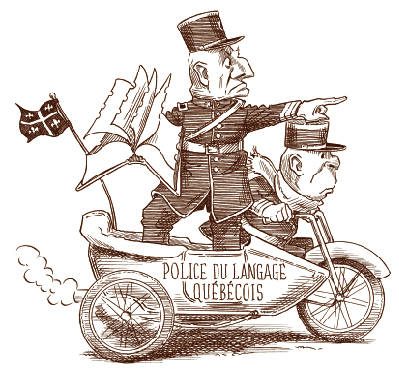- International Affairs
- Law & Policy
- Civil Rights & Race
"The Old Guard dies but never surrenders." That was the defiant reply by one of Napoleon’s generals on June 18, 1815, to the Duke of Wellington’s demand for a French surrender at Waterloo. We all know who won that battle.
I was reminded of this bit of history as I read the latest sortie in the war á outrance against the English language by Quebec’s old guard, the secessionists who are determined to break up Canada. In seeking formal nationhood for Quebec, they are determined to keep the French language from being drowned in an ever-spreading ocean of English speakers in their beloved province.
 |
|
Illustration by Taylor Jones for the Hoover Digest. |
In the meantime the Quebecois are flooded by U.S. television programs from across the border. Nobody in Quebec, where French is the mother tongue of a majority of the province’s 7.4 million people, has as yet suggested electronic jammers to stop this cultural invasion from south of the border.
It is easy to understand the passion of Quebec nationalists to defend their language. Americans who seek to perpetuate English amid multiethnic pressures should (and many do) understand this passion. As a Francophile and ambitiously self-styled Francophone, I sympathize with this Quebec project, which exemplifies that tragedy in politics, the clash of two rights.
Yet it is difficult to sympathize with the old guard’s use of its legislative power to curb the constitutional freedoms of Anglophones and other linguistic groups to use their own language, primarily English, publicly. And in their zeal to defend French, the old guard’s language police punish violators of Quebec’s stringent language laws—for example, English on business signs is permitted but only if the lettering is one-third the size of the French letters—with fines and other threats against business activity. Literal interpretation of the language code has led to some idiotic spectacles.
One of the most popular eateries in Montreal is Schwartz’s Hebrew Delicatessen, deservedly popular because its pastrami on seeded rye is almost as great as that served at New York’s Stage Delicatessen. A few years ago the French Language Office ordered Schwartz’s to reduce the size of the English letters on its bilingual signs or else.
The struggling Pakistani couple who worked seven days a week, 18 hours a day, in their Montreal convenience store were ordered to learn to speak better French to their customers as required by Quebec law or else. Another Asian restaurateur was ordered to stop using English-only beer coasters or face a $7,000 fine.
A Greek immigrant had a van on which he advertised his business—"Bill’s Plumbing and Heating." The language law forbids English on any vehicle whose owner pursues his trade exclusively in Quebec. His truck and tools were seized and auctioned off by the language police because he would not pay the fine imposed for putting "Bill’s Plumbing" on the side of his truck. A mason making gravestones was also attacked because the epitaphs were not bilingual.
Several Passovers ago, inspectors of Quebec’s Office de la langue francaise (French Language Office) ordered some Montreal supermarkets to remove imported kosher foods from their shelves. The supermarkets promptly obeyed because the importers could have gone to jail as well as being fined if they had insisted on selling these otherwise innocent grocery items. The reason for what became known in the Anglo press as the "matzoh bust" was that the labeling on the kosher foods was only in English.
Most recently Quebec’s language police (they are also called "tongue troopers") have invaded the Internet and the World Wide Web in the hunt for unilingual English sites run from Quebec. An Anglo-Canadian runs a web site advertising a computer service—in English. He has been ordered to post a French equivalent web site although he knows no French. A couple whose site peddled an on-site photography business has been ordered to set up a French site as well—or else.
The latest target is a rural Quebec couple whose family has been selling maple syrup for four generations to Americans by mail order. Naturally, their 7-year-old web site is in English because they export 99 percent of their syrup to Americans and Western Canadians. The couple, Stanley Reid and his wife, have hired a lawyer who will argue that the actions of the "tongue troopers" are in violation of the Canadian constitution and the United Nations’ International Covenant on Civil and Political Rights.
No matter what happens in the courts, the language war will go on because the old guard dies but never surrenders.







